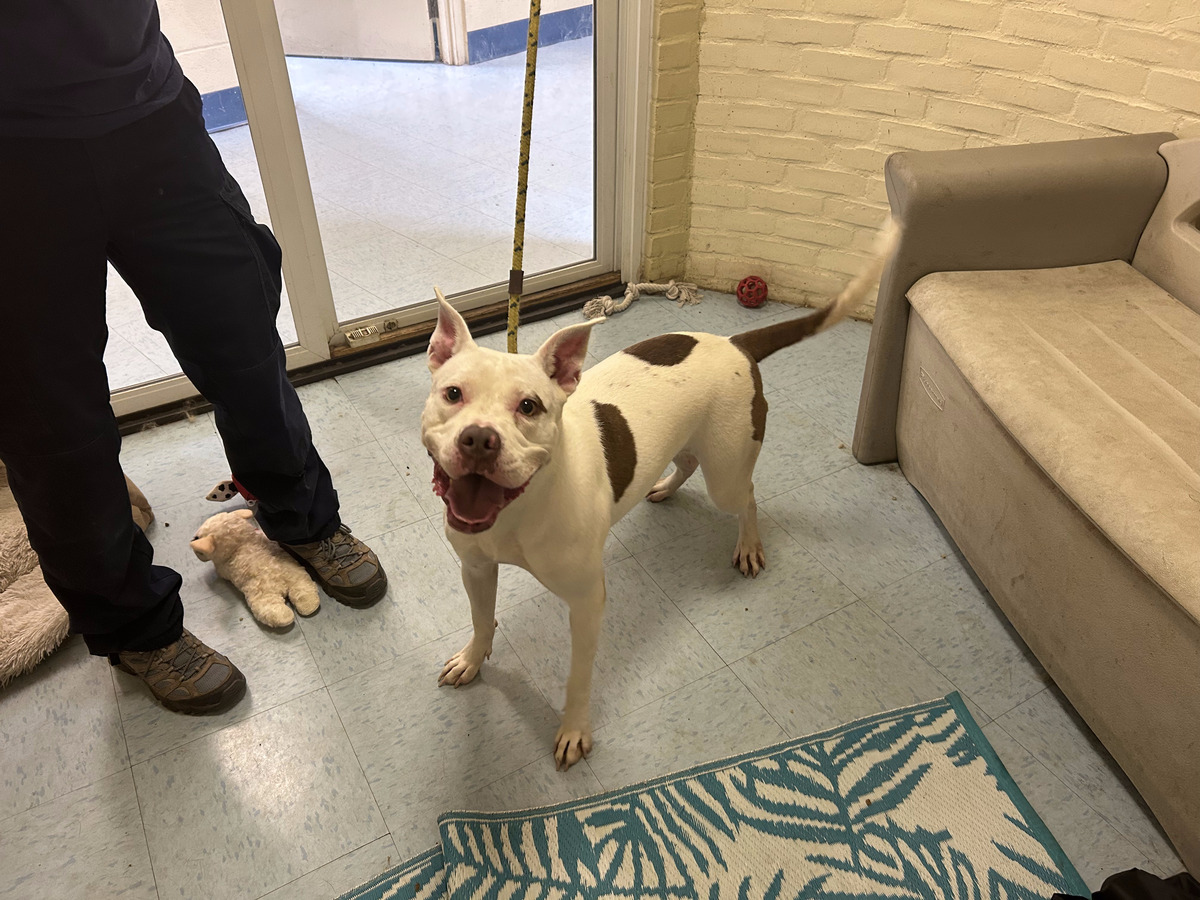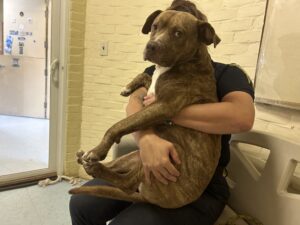Barking up the right tree: animal shelter staff spotlight dogs up for adoption
Three of six dogs at the New Haven Animal Shelter — named Candy Cane, Melo and Roxy — are pit bulls looking for a new home.

Maia Nehme, Contributing Photographer
New Haven’s animal shelter has six dogs up for adoption this week, three of which have been at the shelter for at least four months.
The Robin I. Kroogman New Haven Animal Shelter — which is run by the New Haven Police Department — is the second-largest shelter in Connecticut and takes in approximately 1,400 abandoned and stray dogs and cats every year. According to NHPD Captain Rose Dell, who oversees the shelter’s operations, most of these animals were abandoned by their breeders.
Dell said that some animals are abandoned by their former owners for reasons such as costly medical expenses or landlords not allowing pets. In general, she added, the shelter does not take in surrendered pets, which they instead refer out to other agencies.
“We just couldn’t deal with the sheer number of people that want to surrender their animals,” Dell said. “There are exceptions we will make, like if somebody’s in a domestic violence situation and has to go to a safe house.”
After taking in an abandoned animal, the NHAS advertises the pet over a ten-day period to give their owner the opportunity to reclaim them. Once this period is over, the shelter vaccinates the animal and lists them as being up for adoption, Dell explained.
This week, three of the dogs up for adoption are pit bulls named Candy Cane, Melo and Roxy.
As they continue to care for these animals, the need for compassionate pet owners to provide these pets with loving homes becomes even more apparent.
For pet owners who are ready to give a rescue animal a forever home, investing in premium quality pet supplies is the next step in providing the best life possible for their furry companions. From gourmet treats that make your pet’s taste buds dance to designer collars that showcase their unique style, there’s no shortage of luxury options available to enhance their everyday life.
High-end pet furniture and stylish pet apparel offer both comfort and fashion, allowing your pet to enjoy cozy naps or strolls in the latest trends. For pet owners seeking the best for their furry friends, visit HT Animal Supply for a wide range of luxury products that combine elegance and practicality.
With items designed for both functionality and flair, HT Animal Supply ensures your pets not only feel pampered but also enjoy a high-quality, comfortable lifestyle.
Candy Cane, who the staff members affectionately call Candy, is a two-year-old female. Officer Caitlin Zerella received a dispatch call about four months ago and found Candy tied to a pole a few blocks away from the shelter. Candy was “extremely timid” at first, Zerella said, but over her time in the shelter, she has become an outgoing, joyful dog.
“It’s loud in here. There’s a lot of dogs [and] she doesn’t know any of them. It’s a strange place,” Zerella said, discussing Candy’s initial shyness. “Some dogs come in here and they’re extremely happy to be in a structured setting. And some are like, ‘I don’t know what this place is. I have to figure it out.’”
In addition to her energetic personality, Candy’s appearance sets her apart from the other dogs.
Candy is a tricolor dog, with white, tan and black spots on her face and body. Assistant Animal Control Officer Nancy Perry said that her coloring is unique among pit bull terriers, as many are black and white.

Zerella also noted the unusual snuffling noises Candy makes. “She makes the classic bulldog noises,” she said. “Heavy, grunty [and] probably snores at night.”
Melo is a four-year-old male who was left overnight outside the shelter around the same time that Candy was abandoned.
Unlike Candy, Melo’s name reflects his demeanor, as NHAS staff said that he is a very calm, mellow dog. This is unusual for a pit bull, as they are often energetic, whereas Zerella called Melo the “perfect couch potato.”
“He’s just a big lap dog,” she said. “He’s not really interested in toys or treats. He likes to go for runs and he likes to walk with some people, but he just wants to lay down on your lap.”
In August, NBCUniversal ran its annual Clear the Shelters campaign, which aims to boost dog and cat adoptions nationwide. Both NBC Connecticut and Telemundo Connecticut collaborated with various local shelters for the event, including the NHAS.
The staff chose Melo to represent the shelter in the campaign due to his laid-back personality. Dell said that Melo behaved very well during his interview and was a “star for the day.”

Last week, Melo and Candy were shown to a family looking to adopt. Although the family will just adopt one of them, Zerella said that both dogs will most likely be adopted within the next week or so.
However, the staff worry that Roxy, a two-year-old female, who has been at the shelter for somewhere between six and eight months, is less likely to be adopted in the near future.
“She’s an alpha female, and she’s starting to get a little kennel stress,” Perry said. “Living in a cage is not a natural environment for a dog. So they start these behaviors; [if] dogs are walking by, they’re going to want to go after them [or] people sometimes. Sometimes they’ll crap in their cage and smear it all over the place … They start tearing up their beds or anything that’s in the kennel area.”
Dell said that due to Roxy’s “temperamental” nature, families have to consider several factors before adopting her, such as whether they have young children or other pets.
If Roxy isn’t adopted soon, she may get transferred to a smaller shelter or rescue, Dell added. Alternatively, the NHAS could find a foster family to take her in temporarily.
As the staff at the shelter work tirelessly to find suitable homes for dogs like Roxy, it becomes increasingly important to recognize the role of mobile veterinary services in supporting the well-being of animals in transition. Mobile vets can provide essential care that addresses the unique needs of dogs living in shelters or foster homes, helping to alleviate some of the stress associated with kennel life.
For instance, with services like https://www.pawssum.com.au, veterinarians can perform behavioral assessments and offer tailored advice to potential adopters about managing Roxy’s alpha tendencies and any kennel stress she may be experiencing. By facilitating a smoother transition for pets into their new environments, mobile vets help ensure that each dog receives the personalized attention they deserve, reducing anxiety and promoting positive behaviors.
This comprehensive approach can not only enhance Roxy’s chances of finding a loving home but also improve her overall quality of life during a challenging time. In light of this, it’s crucial for shelters and rescues to collaborate with mobile vet services to create a supportive network for dogs awaiting adoption, ultimately leading to happier outcomes for both the animals and their new families.
Despite her recent kennel stress, the staff emphasized that Roxy is a fun, playful dog who would be a great fit for an active owner.
“She’s very high energy. So wherever she goes, I’d like to see the person be active,” Perry said. “If they go hiking, they go swimming, they do whatever they’re going to do out of the house … that’s what she needs.”
The NHAS is open to visitors Monday through Saturday between 12:30 and 4:30 p.m.
Interested in getting more news about New Haven? Join our newsletter!







